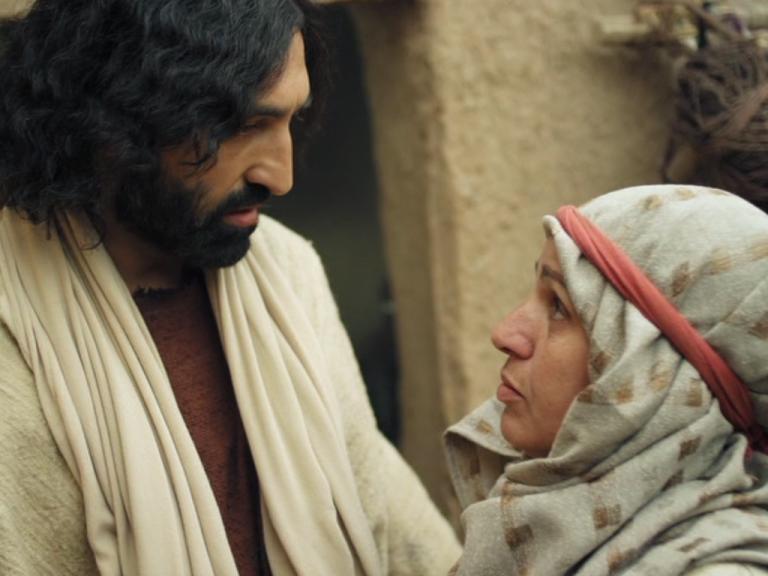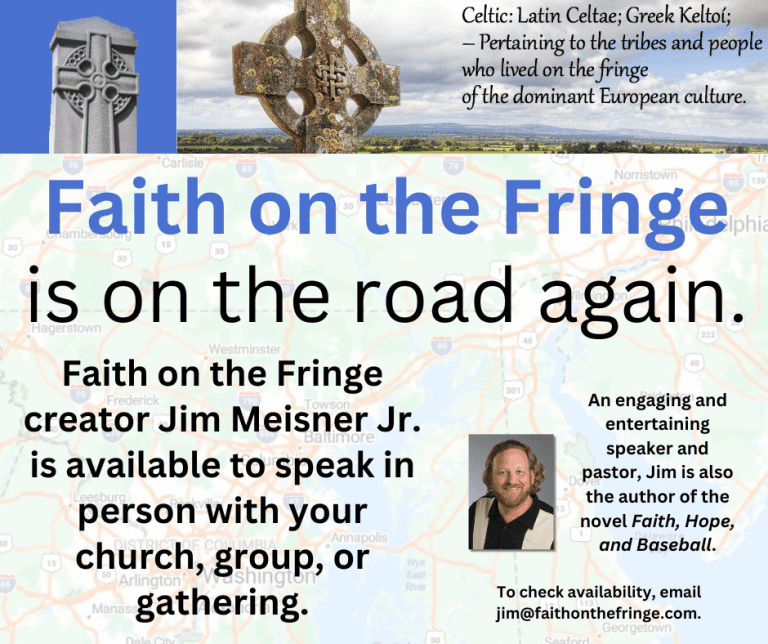“Going to the Dogs”
Notes from a sermon on Mark 7:24-37.
24 Jesus left that place and went to the vicinity of Tyre. He entered a house and did not want anyone to know it; yet he could not keep his presence secret. 25 In fact, as soon as she heard about him, a woman whose little daughter was possessed by an impure spirit came and fell at his feet. 26 The woman was a Greek, born in Syrian Phoenicia. She begged Jesus to drive the demon out of her daughter.
27 “First let the children eat all they want,” he told her, “for it is not right to take the children’s bread and toss it to the dogs.”
28 “Lord,” she replied, “even the dogs under the table eat the children’s crumbs.”
29 Then he told her, “For such a reply, you may go; the demon has left your daughter.”
30 She went home and found her child lying on the bed, and the demon gone.
31 Then Jesus left the vicinity of Tyre and went through Sidon, down to the Sea of Galilee and into the region of the Decapolis. 32 There some people brought to him a man who was deaf and could hardly talk, and they begged Jesus to place his hand on him.
33 After he took him aside, away from the crowd, Jesus put his fingers into the man’s ears. Then he spit and touched the man’s tongue. 34 He looked up to heaven and with a deep sigh said to him, “Ephphatha!” (which means “Be opened!”). 35 At this, the man’s ears were opened, his tongue was loosened and he began to speak plainly.
36 Jesus commanded them not to tell anyone. But the more he did so, the more they kept talking about it. 37 People were overwhelmed with amazement. “He has done everything well,” they said. “He even makes the deaf hear and the mute speak.”

This isn’t an easy scripture to read, because it raises an obvious question.
But first let’s take a quick look back to see how we arrived here.
In the preceding chapters of the Gospel of Mark, Jesus has performed a number of miracles. He’s healed the sick and those possessed by demons. He’s walked on water, and he’s fed thousands of people, using no more than a few fish and pieces of bread.
Jesus has been on the move performing miracles and attracting supporters: Making a name for himself across the region and being followed by a growing crowd of people.
He’s now in the region of Tyre – a Gentile region. Jesus is no longer with his fellow Jews, he’s among non-Jews. People who don’t worship the God of Abraham, as Jesus and his apostles do. Jesus is in a town of non-Jews who worship other gods.
Jesus is trying to keep a low profile in this gentile village, but he’s not having any luck.
A Greek Phoenician woman from Syria approaches Jesus. She has a daughter possessed by a demon, and she’s come seeking the help of this man who she’s heard has driven demons out of other people.
She falls to the ground, begging for help for her child, just as any loving parent would. Knowing Jesus has helped others, she’s begging for his help now.
And what does Jesus say?
How does he respond to her request for help?
“First let the children eat all they want,” he told her, “for it is not right to take the children’s bread and toss it to the dogs.”
Dogs.
Is Jesus calling the people who aren’t the children of Israel, dogs?
Dogs?
In my first class in seminary, during a break, I asked the professor how we should respond to fellow Christians who say they take the Bible literally.
The professor was Dr. Cecil Sherman, a legendary Baptist leader who is literally mentioned in Baptist history books.
Dr. Sherman answered my question, by saying, “Jesus called us dogs. Are you a dog?”
“No sir, I’m not,” I said, not knowing Dr. Sherman was citing this scripture and instead thinking it might be a trick question.
“I’m not a dog, either,” Dr. Sherman said. “Scripture says ‘As a dog returns to his vomit, so a fool repeats his folly,’” he said, quoting Proverbs 26:11. “If you take scripture literally, you’re saying that Jesus thought we were all a bunch of dogs. We’re not dogs, and that’s why you don’t take scripture literally. We take it seriously, but not literally,” Dr. Sherman said.
Have you heard the idiom, “going to the dogs?” Like, “this restaurant is so bad, that since the new owners took over, it’s really going to the dogs.” “Things have gone downhill and are really going to the dogs.”
Maybe that’s what Jesus is doing, using an idiom, a description to evoke a feeling, and not a literal declaration that only the children of Israel deserve the blessings of God through Jesus, and the rest of us are dogs.
The Syrian woman doesn’t waste time arguing with Jesus after being called a dog, or even defending herself when he says she’s a dog. Instead, she engages with him, accepting the premise of his answer and replies, “Lord,” –despite him describing her as a dog, she still acknowledges the sovereignty of Jesus.
“Lord,” she says, “even the dogs under the table eat the children’s crumbs.”
Even the lowest in the house, after the men, after the women, even after the lowest in the house eat, the dogs are there to lick up the crumbs.
“Even after you’ve blessed all the children of Israel, Lord,” the Syrian woman says, “I would still take a small crumb of your blessing and healing power.”
And Jesus responds, “For such a reply, you may go; the demon has left your daughter.”
Jesus heals her daughter from a distance, without ever seeing the child or laying hands or eyes on her. Jesus healed the servant of a Roman officer in the same way.
“Not in all of Israel have I seen faith like yours,” Jesus tells the military man, a gentile. Jesus heals others in the same way, “Your faith has healed you,” Jesus says to people.
So, if Jesus heals the servant – probably a slave – of a Roman officer – a leader of the men oppressing the people of Israel and occupying their land, isn’t this sharing the Lord’s blessing with Gentiles?
I think it’s important to remember, that while Jesus was the son of God, while Jesus was sent by the Creator of all the universe to show us how to live, to tell us how to be in relationship with one another and in relationship with God, to suffer, die on the cross, to be buried and to rise up triumphantly, because not even death could contain him, it’s important that we remember that Jesus is a person, just like us.
Jesus is human. He experiences the emotions and needs that we all face. He gets tired, he gets hungry, and he gets angry. He gets annoyed with his disciples . . . repeatedly irritated with his disciples when they argue among themselves, or when they don’t understand what appear to be basic concepts. Jesus gets frustrated and seemingly short tempered.
Perhaps that’s what’s going on here . . . Jesus is in a Gentile village, away from the thousands of Jewish followers he’s been preaching to, and helping, and healing and dealing with. Perhaps he’s trying to get away from the crowds, and instead he’s confronted by still another person desperately demanding his help.
But the woman sticks with it, she keeps petitioning the Lord for help. She remains faithful, and Jesus rewards her faith by healing her child.
And I guess that’s what faith is, isn’t it? Sticking with it, despite the initial answer; despite the initial rejection; despite the lack of a response that we want or even like, we stick with it. We try again. We believe.
We don’t know when, we may not know how, or where, but we know who. We have faith in a unmarried Jewish man from a little fishing village along the shore of a small lake, in the middle of a desert. We have faith in who he is, and we believe what he says.
We have faith because when the world tried to shut him up, to shut him down, to silence his message and deny his word, he got up out of the grave and walked around, and kept on healing and helping and saving the lost souls – first the lost children of Abraham, and then the rest of us dogs, those of us who aren’t Jewish.
We have faith in him, because he is who he said he was and he did what he said he would do. He overcame the finality of the grave and what was supposed to be the end of his story. He responded to violence with love, responded to hate with forgiveness, responded to destruction with redemption, responded to the grave with grace.
So, that’s the first half of today’s scripture. Let’s look at the other half, which has some uncomfortable issues, as well.
Then Jesus left the vicinity of Tyre and went through Sidon, down to the Sea of Galilee and into the region of the Decapolis. [The 10 cities] There some people brought to him a man who was deaf and could hardly talk, and they begged Jesus to place his hand on him.
*A short note. The geography of this scripture is wrong. Sidon was in the opposite direction of the Sea of Galilee.*
Jesus takes the man away from the crowd and puts his fingers into the man’s ears.
He puts his fingers in the man’s ears.
Okay.
And then he spit, I assume Jesus spit on his own hands, the way he did when he healed a blind man. With the blind man, Jesus spit, and then mixed it with mud, and smeared it all over the guy’s eyes.
Today, Jesus spits, we’re hoping onto his own fingers, and then he touched the man’s tongue. He touched his tongue. He put his spit-soaked fingers into the guy’s mouth. Remember, the man is deaf, so he couldn’t hear Jesus tell him to stick out his tongue, so Jesus had to open the guy’s mouth, and shove his fingers in there.
Jesus looked up, sighed, and said “Ephphatha!” —meaning be opened. The man was healed and could hear and speak plainly.
Jesus told the man and his friends not to tell anyone, but they talked all about the miracle they had experienced.
Repeatedly throughout the Gospels, Jesus asks people not to say anything, and repeatedly, in the next sentence, people run off to spread the good news of what happened to them.
Jesus commands people not to tell anyone, because he knows the more notoriety he gains, the more well-known and famous he becomes, the greater the danger Jesus’ message is to the authorities. Jesus is a danger to both the Roman authorities occupying the land and he’s a danger to the power structure of Judaism.
“Ephphatha!” Jesus says –be opened.
May your ears be opened by Jesus. May our hearts be opened by Jesus.
“Ephphatha.” Be opened.
Like the Syrian woman, stick with it. Maintain your faith, despite rejection. Despite answers you don’t like. Despite the feeling that God has miracles for everyone else but you.
“Ephphatha.” Be opened and willing to let Jesus rub mud in your eyes or stick his fingers in your mouth. Be opened to God moving in the world in ways you don’t like and don’t expect and that might make you uncomfortable.
“Ephphatha.” Be open and let God work miracles in your life.
“Ephphatha.”
Ω
For other articles by Jim, visit:
Notes From a Sermon: James 1:17-27
Christians Must Reject Donald Trump
The Clark Doll Study Documenting the Damage of Segregation
Trump Uses a Slur Against Harris
Ω
Pastor Jim Meisner, Jr. is the author of the novel Faith, Hope, and Baseball, available on Amazon, or follow this link to order an autographed copy. He created and manages the Facebook page Faith on the Fringe.














